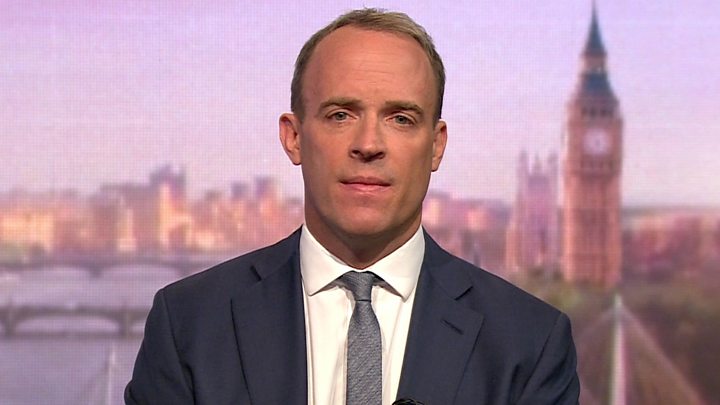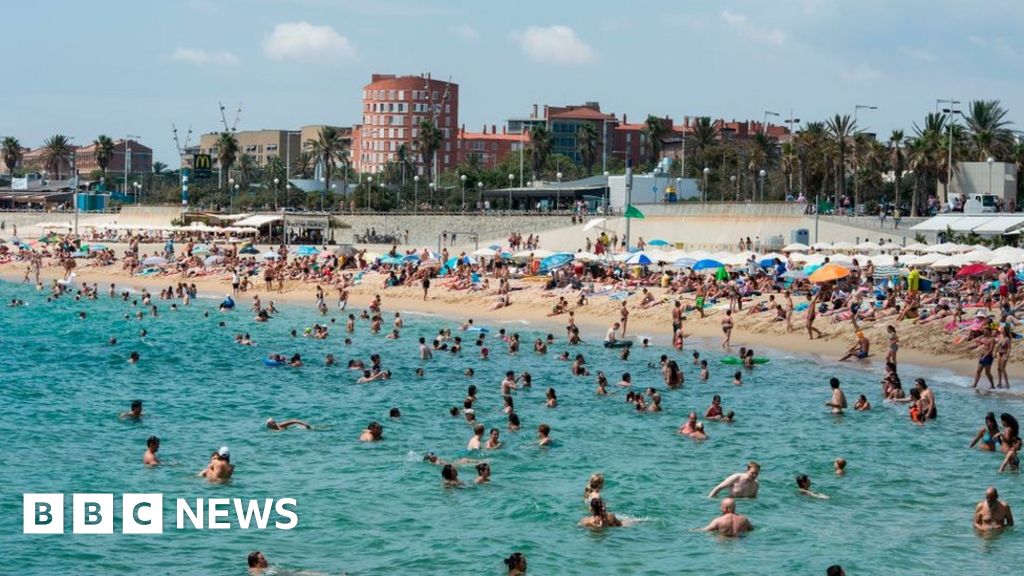
Media playback is unsupported on your device
The government is ready to fly holidaymakers back to the UK if tour operator Thomas Cook collapses, Foreign Secretary Dominic Raab has said.
Mr Raab told the BBC's Andrew Marr Show contingency planning was in place to make sure no-one would be stranded.
But he dampened hopes of a government rescue bid for the firm.
Ministers did not "systematically step in" when businesses went under unless there was "a good strategic national interest", he said.
Mr Raab said he did not want to undermine the rescue talks that Thomas Cook is currently conducting with its biggest shareholder and creditors at City law firm Slaughter & May.
The tour operator could fall into administration within days unless it finds £200m in extra funds.
The Transport Salaried Staffs Association (TSSA) union, which represents Thomas Cook staff, is urging the government to step in with a bail out amid fears the company's collapse could leave about 150,000 British tourists stranded.
Analysis
Katie Prescott, business correspondent
This meeting is crucial for Thomas Cook's survival.
If there is no agreement, then the decision to wind up the company will be taken at a Board meeting this evening. It's likely (looking at the precedent of Monarch's collapse) that any announcement about that will be made late at night, once all planes are on the ground. But the company doesn't have to announce anything until the markets open at 07:00 BST on Monday.
It's low season at the moment, the time of year when Thomas Cook has to pay its suppliers for the busy summer season just gone. Hoteliers are paid on 60 to 90-day terms, once travellers have already taken their holidays. The nightmare scenario is that hoteliers who don't think they will get paid might turn out the people staying with them.
However, it is worth re-stating that the company is still trading. People are still holidaying with Thomas Cook. And while we can assume the company is reining back marketing activity around last-minute deals and offers, until any announcement is made, it is business as usual.
The foreign secretary said he did not want talk of contingency planning to become "a self-fulfilling prophecy".
But he told the BBC the government had learned lessons from the collapse of the Monarch airline in 2017. The UK's consular authorities abroad were ready to assist, he said.
A government spokesperson said: "We recognise it's a worrying time for holidaymakers and employees.
"The financial circumstances of individual businesses are a commercial matter, but the government and the Civil Aviation Authority are monitoring the situation closely."
'Being held hostage'
Meanwhile, holidaymakers staying at a hotel in Tunisia owed money by Thomas Cook have reportedly been prevented from leaving the resort until it has been paid.
Guests at the Les Orangers beach resort in the town of Hammamet, near Tunis, said the hotel was refusing to let them leave because of concerns about Thomas Cook's future.
Customers have reported that the hotel is asking visitors to pay extra money amid fears it will not be paid what it is owed by the tour operator for bookings.
Ryan Farmer, from Leicestershire, told BBC Radio 5 Live the hotel demanded all guests who were due to leave go to reception "to pay additional fees, obviously because of the situation with Thomas Cook".
Security guards closed the hotel's gates as guests refused to pay the extra fee, Mr Farmer claims.
He told the Stephen Nolan show: "I'd describe it as exactly the same as being held hostage."
Thomas Cook customers have been reminded on social media that they have Atol protection - a fund paid for through industry levies - "in the event that Thomas Cook goes into administration".
The travel firm also reassured customers on Saturday night that flights continue to operate as normal.
Rescue call
One of the world's largest travel companies, Thomas Cook was founded in 1841 to operate temperance day trips, and now has annual sales of £9bn.
It employs 22,000 staff, 9,000 of whom are in the UK, and serves 19 million customers a year in 16 different countries.
There are currently 600,000 Thomas Cook customers on holiday, of which 150,000 to 160,000 are British.
TSSA general secretary Manuel Cortes has called on Business Secretary Andrea Leadsom to help Thomas Cook "no matter what", saying it would save thousands of jobs.
Shadow business secretary Rebecca Long Bailey said "the government must consider stepping in and taking an equity stake to avoid this crisis".
Wedding worries
Chloe Hardy from Leicestershire is due to get married in Zante in October and booked the wedding package with Thomas Cook back in June 2018.
Chloe and her fiance will also have 33 family members flying out, with their trips costing more than £33,000 in total.
With the big day looming, Chloe is frustrated by Thomas Cook's handling of their booking.
"We are unsure if we will be able to fly... This is causing great concern, worry and stress to all of us involved."
Mounting difficulties
Thomas Cook's financial difficulties have mounted over the past year, culminating with the agreement in August of a rescue deal led by its biggest shareholder Fosun.
In July, it produced a business plan saying that it needed £900m in refinancing, up from a previous estimate of £150m. The £900m would come from Fosun, the group of creditors and some other investors.
The group of lenders then commissioned an independent investigation. Its financial advisers said Thomas Cook would require an additional £200m on top of the £900m already required, which would bring the total refinancing needed up to £1.1bn.
Thomas Cook succeeded in finding a backer to provide the additional £200m, but the BBC understands it has since pulled out.
The firm has blamed a series of problems for its profit warnings, including political unrest in holiday destinations such as Turkey, last summer's prolonged heatwave and customers delaying booking holidays because of Brexit.
What are your rights?
If you are on a package holiday you are covered by the Air Travel Organiser's Licence scheme (Atol).
The scheme will pay for your accommodation abroad, although you may have to move to a different hotel or apartment.
Atol will also pay to have you brought home if the airline is no longer operating.
If you have holiday booked in the future you will also be refunded by the scheme.
If you have booked a flight-only deal you will need to apply to your travel insurance company or credit card and debit card provider to seek a refund.
When Monarch Airlines collapsed in 2017, the government organised to bring home all the stranded passengers, whether they were covered by Atol or not.
Here is more information on Atol protection and Your questions answered
Are you a Thomas Cook customer or member of staff? If you've been affected by the issues raised here, you can get in touch by emailing haveyoursay@bbc.co.uk.
Please include a contact number if you are willing to speak to a BBC journalist. You can also contact us in the following ways:
- WhatsApp: +44 7756 165803
- Send pictures/video to yourpics@bbc.co.uk
- Upload your pictures / video here
- Tweet: @BBC_HaveYourSay
- Text an SMS or MMS to 61124 (UK) or +44 7624 800 100 (international)
https://www.bbc.com/news/business-49785426
2019-09-22 07:24:50Z
52780389678619


